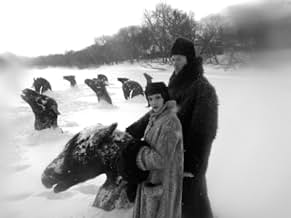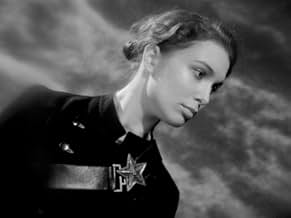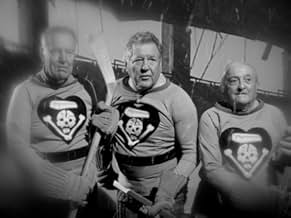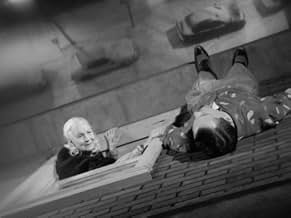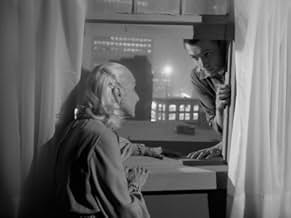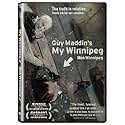IMDb रेटिंग
7.5/10
5.9 हज़ार
आपकी रेटिंग
अपनी भाषा में प्लॉट जोड़ेंFact, fantasy and memory are woven seamlessly together in this portrait of film-maker Guy Maddin's home town of Winnipeg, Manitoba.Fact, fantasy and memory are woven seamlessly together in this portrait of film-maker Guy Maddin's home town of Winnipeg, Manitoba.Fact, fantasy and memory are woven seamlessly together in this portrait of film-maker Guy Maddin's home town of Winnipeg, Manitoba.
- पुरस्कार
- 4 जीत और कुल 17 नामांकन
फ़ीचर्ड समीक्षाएं
Guy Maddin described My Winnipeg as 'docutasia' and that's probably more accurate than any other description I could give of it. The film is a very personal, light-hearted, but informative, look at Winnipeg through the eyes of her native son Guy Maddin. The film is shot in black and white, combining stock archival footage (including private home videos) with some new freshly shot material. The film follows a young Guy Maddin (played by Darcy Fehr) on a train trying to escape from 'sleepy, snowing, Winnipeg' and its mystic pull. To affect his escape Maddin must, through the course of the film, come to terms with everything that binds him to the city (family, home, community, and history). Held together by the barest narrative thread, the film is most like Berlin: Symphony of a Great City, though being Canadian it's much funnier and self-deprecating. The film is narrated by Guy Maddin himself, and despite the fact that he seemed to have many reservations about using his own voice, he does a great job (ranging from the fiery sermon of charged propagandist to the soft relaxing repetition of an experienced hypnotist). Made for the documentary channel, with a TV audience in mind, the film is accessible enough for anyone and funny enough to make even Winnipeg charming. While I don't know if it's feature film material, definitely watch if you can catch it on the tube.
Screened with live director-narration at the Sydney Film Festival, My Winnepeg was not always easy to engage with but was, ultimately, one of the most satisfying filmic experiences of the Festival fortnight to-date.
Mixing surreal, dreamlike images with heartfelt reminiscents, Guy Maddin created extraordinary cinema that will linger long in the memory of all that witnessed it.
The first 20 minutes are the toughest slog - it takes a little while to comprehend exactly the direction this loving-yet-satirical homage to Maddin's home town is trying to accomplish. And I also have reservations as to how this is going to play to audiences without the immediate, personal engagement the live-narration provides - the connection the on-stage presence provided made for an intimacy that may not be otherwise available.
But, with no reservation, the dreamlike images, coupled with the heartfelt words of the creator, made for a unique, beautiful, hilarious, moving experience. This is a major work from an extraordinary talent; a must-see for those that crave films that engage the head and the heart.
Mixing surreal, dreamlike images with heartfelt reminiscents, Guy Maddin created extraordinary cinema that will linger long in the memory of all that witnessed it.
The first 20 minutes are the toughest slog - it takes a little while to comprehend exactly the direction this loving-yet-satirical homage to Maddin's home town is trying to accomplish. And I also have reservations as to how this is going to play to audiences without the immediate, personal engagement the live-narration provides - the connection the on-stage presence provided made for an intimacy that may not be otherwise available.
But, with no reservation, the dreamlike images, coupled with the heartfelt words of the creator, made for a unique, beautiful, hilarious, moving experience. This is a major work from an extraordinary talent; a must-see for those that crave films that engage the head and the heart.
A tribute, kind of, to the great city of Winnipeg, Manitoba (I'm not being facetious-I've been there), this is an 80 minute documentary about the place. It accentuates the winter's bitter cold, the days gone by (some of the images are amazing) and what the city meant and means to Mr. Maddin. This film is not for everyone. It is in black and white and grainy. At first, I wasn't sure if this was a mockumentary, but even though the narrator laments the passing of people and places, I was wondering if the whole point was to explain why people don't leave. Sure, its no Toronto, Montreal or Vancouver (you get the idea), but its a medium size city that thrives. I have seen Mr. Maddin's "Saddest Music In The World", so I know I was expecting something different. Maybe you have no interest in Winnipeg (or can even find it on a map!), but that doesn't detract from the narrative. An added bonus is Ann Savage playing the narrator's mother. Wow, she is in her mid 80's and she agreed to do this role. I don't expect mass agreement here, but if you were commissioned to do a film about your hometown, I'm not sure how different your film would be than this, especially if you life in a city thats cold in the winter. I'm waiting for "My Buffalo" or "My Fargo". For now, I'm quite content with this film that moved me and even taught me about the city. A great left of center cinematic achievement.
Winnipeg is to Guy Maddin as Baltimore is to John Waters. It's very unfashionability is its inspiration. But where Waters dwells on hairspray and bouffant dresses and twisted vowels, Maddin describes Winnipeg as a place of perpetual snow, destroyed hockey rinks, and sleepwalkers. "Winnipeg, Winnipeg, Winnipeg, Winnipeg...." he begins his incessant voice-over as the first of his typically distressed, nostalgic black and white images in square format appear showing long-ago men and women walking in snow-covered streets and a man dozing in a train car whose big window is like a movie screen showing figures and the big face of his mother. Sometimes blurry phrases flicker onto the screen echoing his words, like a refrain.
The man (Darcy Fehr) is meant to be himself, getting out of town. "I've got to leave it, I've got to leave it," he chants, and then speculates that maybe he can film his way out of Winnipeg, putting all his past on celluloid and thereby ridding himself of its fascination so he can move elsewhere.
For this poem and rant about his native city, which he says he wants to leave and can't, Maddin hired actors to play his mother and some of his siblings and borrowed his girlfriend's pug to stand in for the childhood chihuahua. He leased their old house and moved the old furniture (or facsimiles) into it, distributing a runner carpet and shabby couches in the living room and an old TV. His mother is played by veteran B-picture vixen Ann Savage. Black and white images of what purports to be his real family back in the Fifties flash on the screen alternating with their hired look-alikes as Maddin spins arcane anecdotes about his childhood and drops in the occasional fact. An old department store and a restaurant that served orange jello figure prominently, as does the dynamiting of a treasured tree and a hockey arena. If there is a logic to this quirky ramble, it's as sui generis as you can get.
We don't come away with a sense of Maddin's actual past, because all his anecdotes seem highly embroidered, like his mother's grabbing some friends' 75-year-old myna bird--which ran free in the house and had "a large vocabulary"--and smashing it to the floor because she was afraid of birds. Or the family threatening their mother with a parakeet to make her get out of bed and cook them a meatloaf. Or the team of ancient hockey stars, all suited up, one known to be dead his face all covered in bandages, playing in a half-destroyed arena, while Maddin sings their praises and curses the establishment of the NHL, which he regards as the beginning of the end. He says his father was a hockey executive, and he grew up in the locker room--was even born in the dressing room of the Winnipeg Maroons. According to him, Winnipeg has a secret network of back streets that parallels the main ones, and to pacify two rival taxi companies one was allowed to ride only on the main streets and the other only on the back alleys, where the ride over the snow is cushiony. The city he invents has an annual "If Day" when the town is invaded by mock Nazis who rename it "Himmlerstadt." A racetrack fire disaster caused a dozen horses to become buried in the earth with just their giant heads out of the snow in attitudes of agony. People come later to visit and picnic. In the family living room they watch a show called "Ledge Man" every day (it's run "for fifty years") in every episode of which the actress playing Maddin's mother talks the actor playing Maddin out of jumping from a ledge to his death.
Maddin calls this film, done for the "Documentary Channel," a "docu-fantasia," and that's what it is--sort of. It's hard to pin a genre to his film-making and this one is also an imaginary autobiography. He depicts himself living in an insular snow-globe parallel universe (sometimes fake slant lines of white snow are superimposed on scenes)--like the parallel system of back streets. The voice-over is a kind of crotchety incantation; Maddin has said this could be called "A Self-Destructive Sulk." What entertains, in its fey and offbeat way, is the man's humorous detachment; what appeals is the sense of a cozy far-off snowed-in world whose present is so remote it's like its past, a town that isn't very old but seems as if it is. For all the detail about growing up in a hairdressing establishment, lying in the living room with the family watching TV, being trapped in an indoor swimming pool complex on three levels among naked boys with "hairless boners" who refuse to swim, there's no sense of personal revelation at all, any more than in Dylan Thomas' "A Child's Christmas in Wales." And in his interweaving of the invented and the real, the contemporary and the archival in flickering dreamlike images, this movie has the power to enchant.
But also to numb. If Winnipeggers are sleepwalkers, the viewers of 'My Winnipeg' may at moments become sleep-sitters. And yet for a filmmaker so obviously withdrawn and secretive, this is his most autobiographical and perhaps most accessible and appealing work so far. "Amusing, elegant, inconsequential and it doesn't overstay its limited welcome," a London critic writes. I guess that's fair.
The man (Darcy Fehr) is meant to be himself, getting out of town. "I've got to leave it, I've got to leave it," he chants, and then speculates that maybe he can film his way out of Winnipeg, putting all his past on celluloid and thereby ridding himself of its fascination so he can move elsewhere.
For this poem and rant about his native city, which he says he wants to leave and can't, Maddin hired actors to play his mother and some of his siblings and borrowed his girlfriend's pug to stand in for the childhood chihuahua. He leased their old house and moved the old furniture (or facsimiles) into it, distributing a runner carpet and shabby couches in the living room and an old TV. His mother is played by veteran B-picture vixen Ann Savage. Black and white images of what purports to be his real family back in the Fifties flash on the screen alternating with their hired look-alikes as Maddin spins arcane anecdotes about his childhood and drops in the occasional fact. An old department store and a restaurant that served orange jello figure prominently, as does the dynamiting of a treasured tree and a hockey arena. If there is a logic to this quirky ramble, it's as sui generis as you can get.
We don't come away with a sense of Maddin's actual past, because all his anecdotes seem highly embroidered, like his mother's grabbing some friends' 75-year-old myna bird--which ran free in the house and had "a large vocabulary"--and smashing it to the floor because she was afraid of birds. Or the family threatening their mother with a parakeet to make her get out of bed and cook them a meatloaf. Or the team of ancient hockey stars, all suited up, one known to be dead his face all covered in bandages, playing in a half-destroyed arena, while Maddin sings their praises and curses the establishment of the NHL, which he regards as the beginning of the end. He says his father was a hockey executive, and he grew up in the locker room--was even born in the dressing room of the Winnipeg Maroons. According to him, Winnipeg has a secret network of back streets that parallels the main ones, and to pacify two rival taxi companies one was allowed to ride only on the main streets and the other only on the back alleys, where the ride over the snow is cushiony. The city he invents has an annual "If Day" when the town is invaded by mock Nazis who rename it "Himmlerstadt." A racetrack fire disaster caused a dozen horses to become buried in the earth with just their giant heads out of the snow in attitudes of agony. People come later to visit and picnic. In the family living room they watch a show called "Ledge Man" every day (it's run "for fifty years") in every episode of which the actress playing Maddin's mother talks the actor playing Maddin out of jumping from a ledge to his death.
Maddin calls this film, done for the "Documentary Channel," a "docu-fantasia," and that's what it is--sort of. It's hard to pin a genre to his film-making and this one is also an imaginary autobiography. He depicts himself living in an insular snow-globe parallel universe (sometimes fake slant lines of white snow are superimposed on scenes)--like the parallel system of back streets. The voice-over is a kind of crotchety incantation; Maddin has said this could be called "A Self-Destructive Sulk." What entertains, in its fey and offbeat way, is the man's humorous detachment; what appeals is the sense of a cozy far-off snowed-in world whose present is so remote it's like its past, a town that isn't very old but seems as if it is. For all the detail about growing up in a hairdressing establishment, lying in the living room with the family watching TV, being trapped in an indoor swimming pool complex on three levels among naked boys with "hairless boners" who refuse to swim, there's no sense of personal revelation at all, any more than in Dylan Thomas' "A Child's Christmas in Wales." And in his interweaving of the invented and the real, the contemporary and the archival in flickering dreamlike images, this movie has the power to enchant.
But also to numb. If Winnipeggers are sleepwalkers, the viewers of 'My Winnipeg' may at moments become sleep-sitters. And yet for a filmmaker so obviously withdrawn and secretive, this is his most autobiographical and perhaps most accessible and appealing work so far. "Amusing, elegant, inconsequential and it doesn't overstay its limited welcome," a London critic writes. I guess that's fair.
A love poem to Canadian auteur Guy Maddin's soon-to-be-former home, MY WINNIPEG feels like a fever dream that brings together past, present, and future. Repeated words and phrases form a hypnotic cadence as Maddin's cinematic stand-in (Darcy Fehr) chugs through the snowy darkness. "Winnipeg, Winnipeg, Winnipeg," is the chant, rising and falling like the locomotive drone of the night train carrying its somnambulistic fares through Manitoba's premiere city.
Winnipeg; heart of the heart of Canada, the place that raised Maddin. With a hockey arena for a father and a hair salon for a mother (for more hockey and hairdressing see Maddin's earlier COWARD BENDS THE KNEE), Madding explores the structural arteries of his home town and revisits the history of himself and his city. Narrated by the filmmaker, the prose of the film (courtesy of long-time Maddin crony George Toles) is an overwrought poem of maniacal hyperbole and enthusiastic linguistic gymnastics; a perfect pitch for the fractured visuals of Maddin's multimedia pastiche. Looking like a daguerreotype picture postcard of this snowbound wonderland, MY WINNIPEG typifies Maddin's mad genius and captures his sordid relationship with his home.
Winnipeg; heart of the heart of Canada, the place that raised Maddin. With a hockey arena for a father and a hair salon for a mother (for more hockey and hairdressing see Maddin's earlier COWARD BENDS THE KNEE), Madding explores the structural arteries of his home town and revisits the history of himself and his city. Narrated by the filmmaker, the prose of the film (courtesy of long-time Maddin crony George Toles) is an overwrought poem of maniacal hyperbole and enthusiastic linguistic gymnastics; a perfect pitch for the fractured visuals of Maddin's multimedia pastiche. Looking like a daguerreotype picture postcard of this snowbound wonderland, MY WINNIPEG typifies Maddin's mad genius and captures his sordid relationship with his home.
क्या आपको पता है
- ट्रिवियाDirector Guy Maddin provided live narration at many film festival screenings.
- क्रेज़ी क्रेडिटTapioca Wrangler - Marnie Patuck
- कनेक्शनFeatured in My Winnipeg: Live in Toronto (2008)
- साउंडट्रैकWonderful Winnipeg
Written by Leon Naleway
Performed by The Swinging Strings (vocal by Jim Wheeler)
Courtesy Shawn Nagy
Played during the opening credits
टॉप पसंद
रेटिंग देने के लिए साइन-इन करें और वैयक्तिकृत सुझावों के लिए वॉचलिस्ट करें
- How long is My Winnipeg?Alexa द्वारा संचालित
विवरण
- रिलीज़ की तारीख़
- कंट्री ऑफ़ ओरिजिन
- आधिकारिक साइटें
- भाषा
- इस रूप में भी जाना जाता है
- 나의 위니펙
- फ़िल्माने की जगहें
- उत्पादन कंपनियां
- IMDbPro पर और कंपनी क्रेडिट देखें
बॉक्स ऑफ़िस
- बजट
- $6,00,000(अनुमानित)
- US और कनाडा में सकल
- $1,59,363
- US और कनाडा में पहले सप्ताह में कुल कमाई
- $14,309
- 15 जून 2008
- दुनिया भर में सकल
- $3,16,743
- चलने की अवधि1 घंटा 20 मिनट
- रंग
- ध्वनि मिश्रण
- पक्ष अनुपात
- 1.33 : 1
इस पेज में योगदान दें
किसी बदलाव का सुझाव दें या अनुपलब्ध कॉन्टेंट जोड़ें








